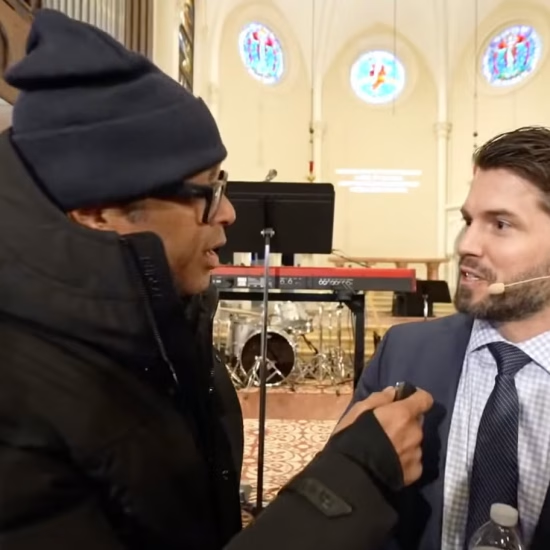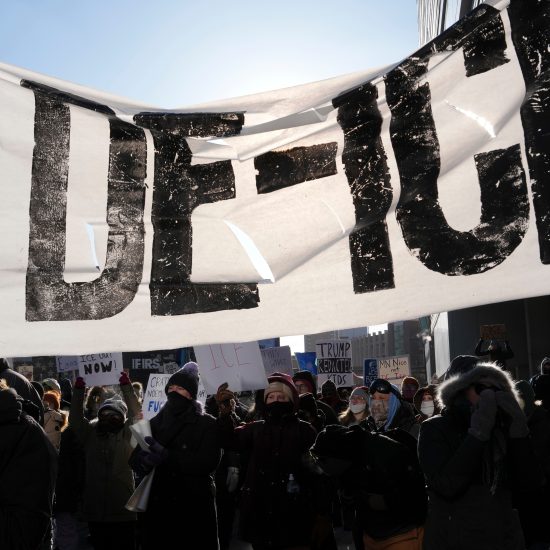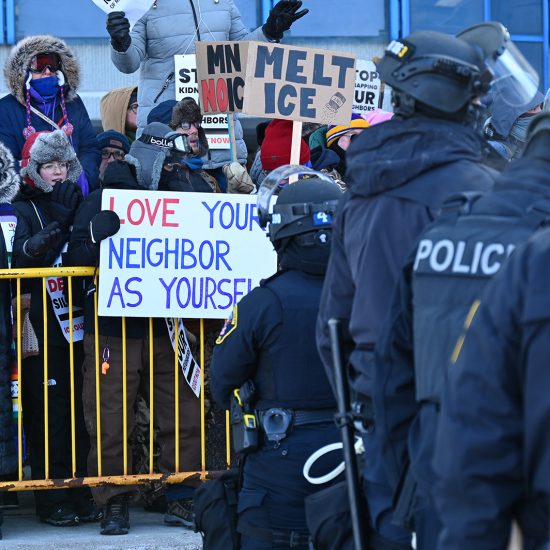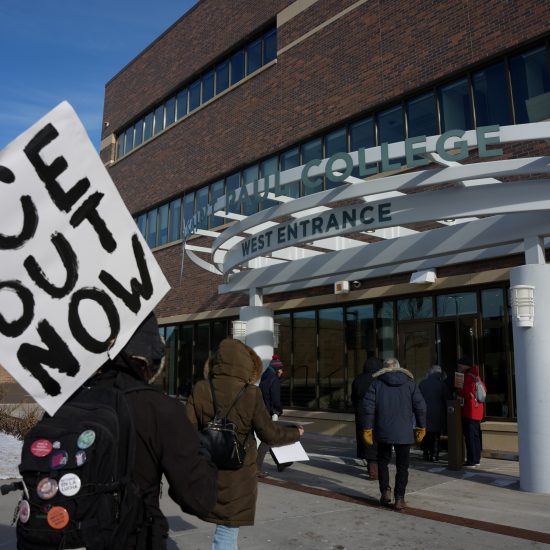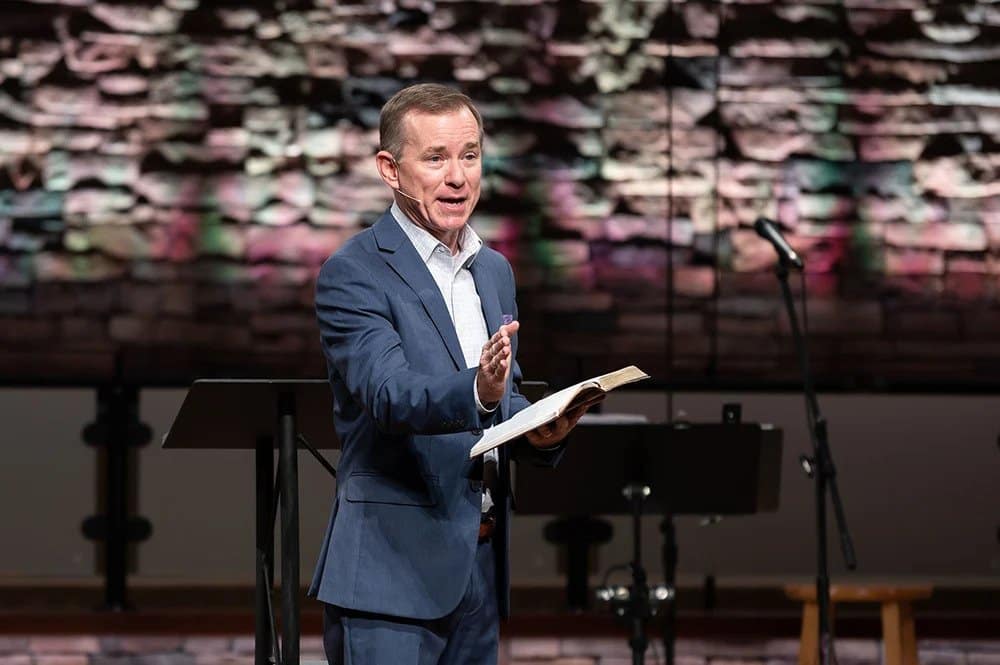
(RNS) — An ongoing feud between a pair of former Southern Baptist leaders is headed to court. Lawyers for Georgia pastor Mike Stone filed a complaint Monday (Oct. 18) in the U.S. District Court for the Middle District of Tennessee accusing former Southern Baptist ethicist Russell Moore of defamation, false light invasion of privacy, and intentional infliction of emotional distress. Stone, pastor of Emmanuel Baptist in Blackshear, Georgia, seeks at least $750,000 in damages.

Pastor Mike Stone. (Brauda Studios/Religion News Service)
The complaint centers on a pair of letters written by Moore, describing his conflicts with other Baptist leaders while he was serving as president of the Southern Baptist Convention’s Ethics and Religious Liberty Commission. In those letters, Moore claims that the Executive Committee exonerated a church that had covered up sexual abuse and that he was pressured to silence an abuse survivor who spoke at an ERLC conference on sexual abuse. His opponents, wrote Moore in a February 2020 letter to the Executive Committee, wanted him to “live in psychological terror.”
That letter was eventually leaked to the press and was published by Religion News Service on June 2, 2021, two weeks before the SBC’s annual meeting. While Stone was not mentioned by name, the letter does refer to him in his former role as chair of the Executive Committee.
Stone also was the driving force behind a 2021 report to the Executive Committee that labeled Moore and the ERLC as a “significant distraction” from the SBC’s mission.
“The ERLC has been a stumbling block not worth the mission dollar investment,” the report quoted a Southern Baptist official as saying.
Moore had previously faced an investigation by the Executive Committee prompted by his criticism of Donald Trump, which led some Southern Baptist churches to withhold donations from the denomination.
The complaint also cites a second letter, dated May 31, 2021, written by Moore to then-SBC President J.D. Greear, a North Carolina megachurch pastor. That letter accused Stone and other leaders of blocking efforts to address sexual abuse in the denomination.
“You and I both know how leadership in the Executive Committee, at the trustee level with Mike Stone and his allies, and at the staff level by former Executive Vice-President Augie Boto, have stonewalled many attempts at reform for the sake of the sexually abused,” Moore wrote in that letter, which was later made public.
Those letters helped fuel a grassroots effort for an independent investigation into the Executive Committee’s handling of sexual abuse in recent decades. That investigation was approved at the SBC’s annual meeting and is currently underway.
Stone says that the letters contained false allegations that damaged his reputation and diminished his future earnings. The complaint also blames Moore’s letters for Stone’s loss in a hotly contested race for president of the SBC and says Moore’s statements cost Stone money.
“Plaintiff’s business operations have already been negatively impacted by Defendant’s untruthful statements due to a decreased trust and confidence in Plaintiff in the religious community, and the Plaintiff’s pastoral efforts will undoubtedly suffer decreased church attendance and a reduction in donations and honorariums because of Defendant’s statements which are untruthful and have cast Plaintiff in a false light.”
The complaint states that Stone denies any allegation that he opposed sexual abuse reforms in the SBC and says that Stone, who has identified himself as a survivor of childhood sexual abuse, suffered “extreme mental anguish and emotion distress” due to Moore’s actions.
“As a direct and proximate result of Defendant’s false and defamatory statements, Plaintiff has suffered a tremendous loss in professional cultivation and reputational standing, decreased earning power, the presidency of the SBC, and serious mental and emotional injury in the form of extreme public embarrassment, stress, anxiety, and fear.”
Moore did not respond to a request for comment.
In the past, Stone has discouraged his congregation from suing other Christians.
“Let’s say somebody defames your character with unfounded gossip,” he said in a sermon titled “Stop Airing Your Dirty Laundry Part 1” in January 2018. “The legal thing to do and I’m not just talking about a lawsuit, I mean the understandable natural thing to do might be to defend your name. The godly thing might be let it go.”
Stone is a leading figure in the Conservative Baptist Convention, which has accused Moore, who resigned as ERLC president in May, Greear and other SBC leaders of being “liberals” who have led the SBC away from its conservative values — in particular, because of their statements on combating racism and addressing abuse.
Leaders of the CBN were key players in recent debates in the Executive Committee over the third-party abuse investigation that was approved at the SBC annual meeting in June. As part of that investigation, local church delegates, known as messengers, had instructed the committee to make its private conversations with its lawyers available to investigations.
Rod Martin, a Florida businessman and member of both the Executive Committee and the steering committee of the CBN, was an outspoken opponent of waiving that attorney-client privilege. After weeks of debate, the committee voted to waive privilege. Martin and other CBN leaders have blamed Moore for stirring up controversy over sexual abuse in the denomination and causing trouble for the Executive Committee. In a recent podcast from Founders Ministries, another conservative SBC group that backed Stone’s presidential bid, Martin was asked about the controversies in the Executive Committee, which made headlines in recent weeks.
“What happened is Russell Moore,” said Martin. “As you know, Russell Moore, who used to be the chief ethicist of the Southern Baptist Convention, was head of the Ethics and Religious Liberty Commission for the last several years, suddenly resigned at the end of May and on his way out, in typical disgruntled employee fashion, carpet-bombed his employer.”
While Martin said he supported the investigation, he also said that it was designed to attack enemies of Moore.
The feud between Moore and Stone is part of a set of larger challenges facing the nation’s largest Protestant denomination, which has lost more than 2 million members since 2006. A debate over critical race theory has led a number of Black pastors to leave the denomination. And a series of high-profile leaders have stepped down since 2018 due to controversy, including Ronnie Floyd, president of the Executive Committee, who will leave office at the end of this month.


